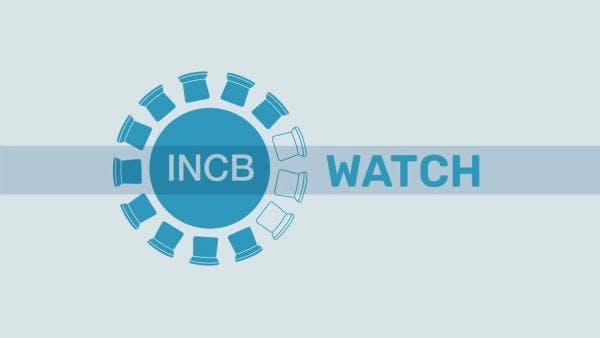INCB Watch: High Level Meeting on Ending AIDS
The High Level Meeting on Ending AIDS took place between 8th and 10th June 2016 in New York. On the final day, INCB President Mr Werner Sipp spoke, congratulating Member States on the UN General Assembly’s adoption of the Political Declaration on HIV and AIDS: On the Fast-Track to Accelerate the Fight against HIV and to End the AIDS Epidemic by 2030
Werner Sipp noted that the INCB has used its Annual Reports to draw attention to prevention, treatment and rehabilitation, thereby reducing the ‘negative consequences of drug use’. Such interventions can help to reduce the transmission of the HIV virus resulting from the sharing of infected needles and syringes. Mr Sipp sought to remind the delegates present that the objective of the international drug control treaties is to safeguard individual and public health.
It is worth recalling, nonetheless, that notwithstanding its newfound self-image and its claims that the emphasis on health reaches back decades into the history of the conventions, the Board has at times been remarkably hostile to harm reduction measures such as the distribution of clean needles and syringes. In the words of Mr Philip Emafo, a former occupant of the Presidential role now assumed by Mr Sipp:
‘…to promote drug use illicitly through the giving out of needles…would, it seems to me, amount to inciting people to use drugs, which would be contrary to the provisions of the Conventions’.
The tone of Mr Sipp’s intervention represents a radical change in the Board’s public discourse over the last decade and a half. The Conventions must, he said, be implemented in a comprehensive, balanced and proportionate manner, ‘with full respect for human rights’. Despite this welcome change in the position of the Board, the institution continues to be opposed to the work of safer injection facilities, which were termed ‘opium dens’ by former INCB Secretary Koli Kouame. Safer injection facilities expand on the iconic harm reduction measure of dispensing clean injection equipment, and may be seen as a further health intervention.
Yet the Board expresses its hostility to these facilities. So, alongside the positive and progressive elements of change that are visible in the operation of the INCB, continuity with the old, repressive face of the Board may still be seen. There remains, consequently, a considerable way to go in the INCB’s journey of transformation toward an institution centred on health, human rights and the fundamental goals of the United Nations.
Keep up-to-date with drug policy developments by subscribing to the IDPC Monthly Alert.
Regions
Related Profiles
- Christopher Hallam
- International Narcotics Control Board (INCB)
